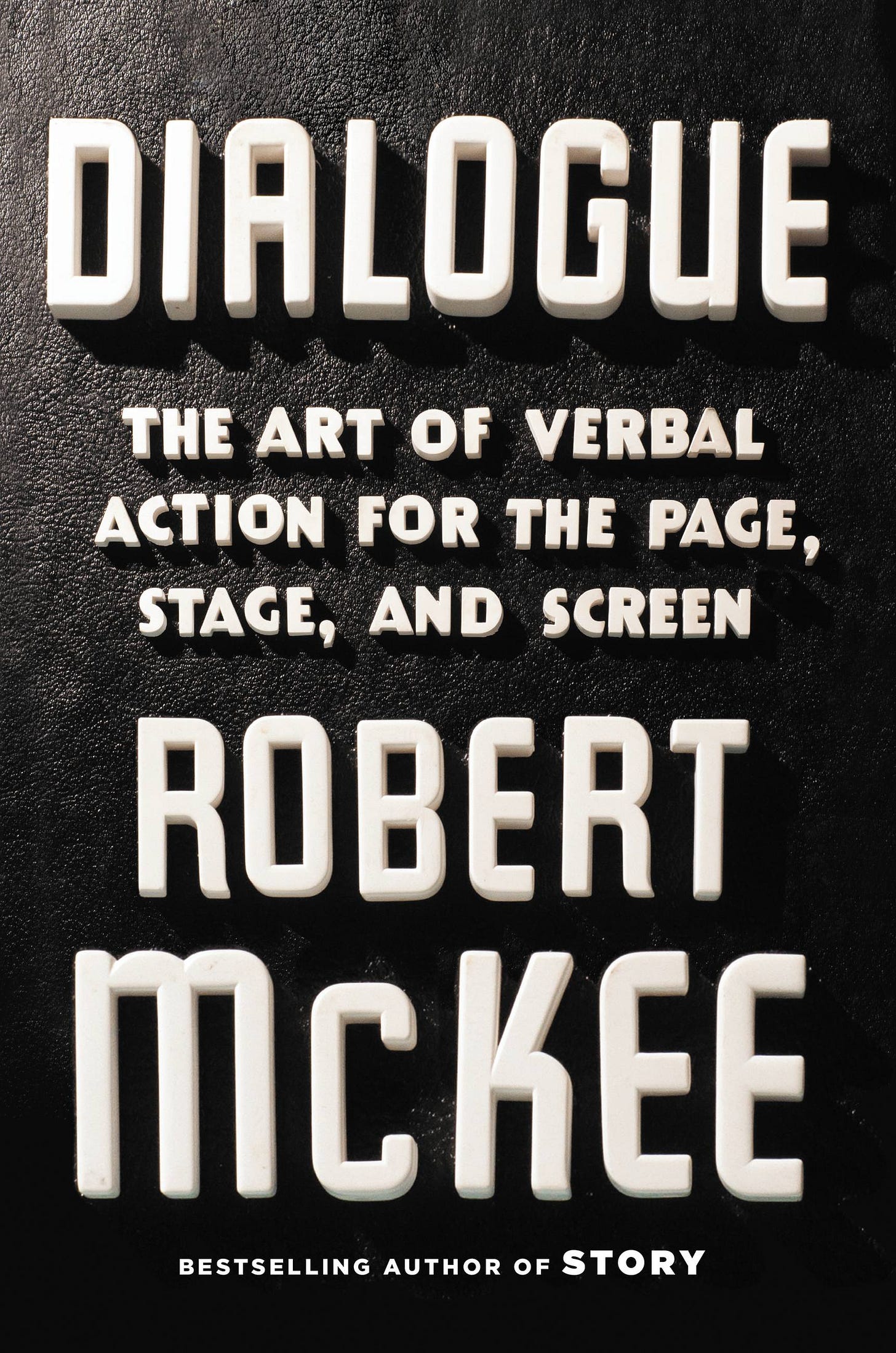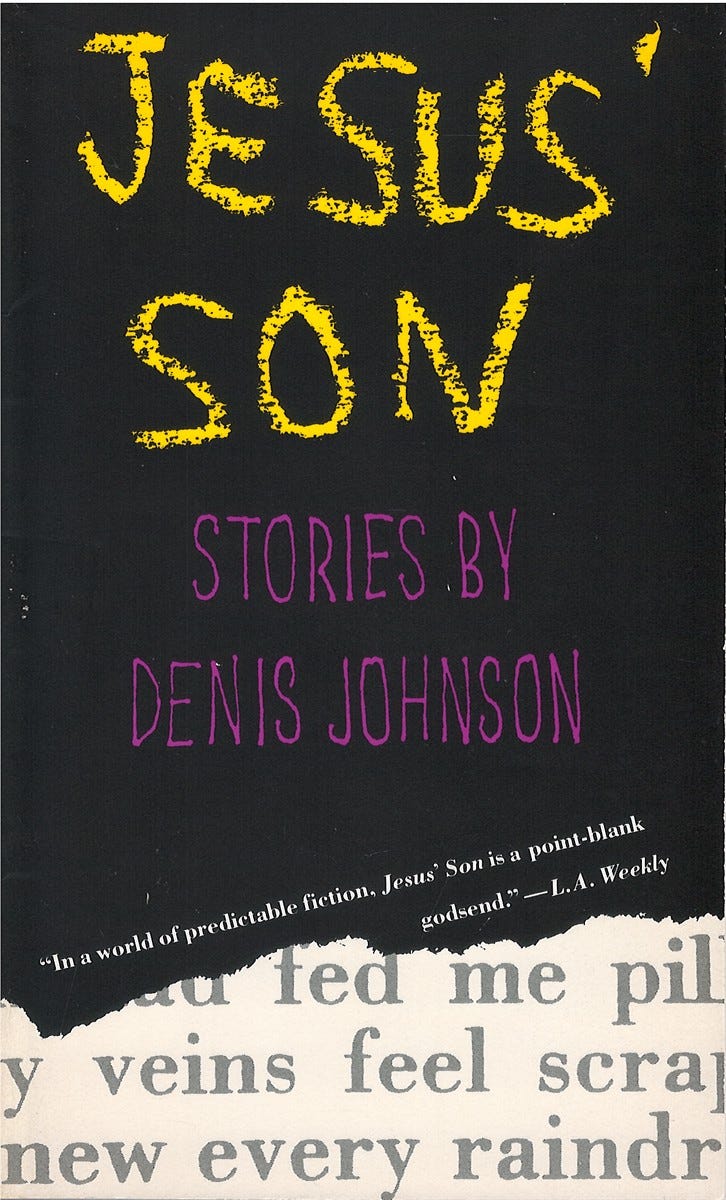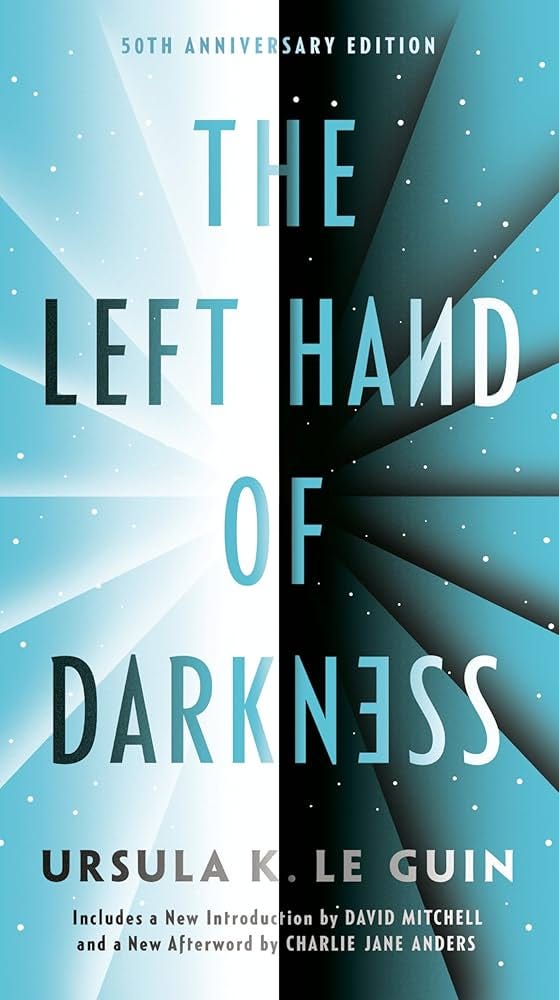#55: Using Cue Words to Structure Better Dialogue
Denis Johnson, Ursula K. Le Guin, Robert McKee
Hello friends! A few bits of news before I get to this month’s craft essay:
First, the ASU Worldbuilding Initiative returns this Wednesday with "Cones and Caution: The Precarity of Signaling the Future"! Among other topics, we’ll discuss: How might the meaning of language or symbols change over time? Is it even possible to exactly express ourselves across great spans of time? Our speakers for this workshop will be Ron Broglio, author of Animal Revolution, speaking about his "Feral Cones" project, and Erika Hanson, an interdisciplinary artist and researcher whose work is rooted in textile practices, whose talk draws on observations at Hawai’i Volcanoes National Park. The event is free and open to the public, including by livestream. Register here to join!
Second, my “Revision, Rewriting, and Re-Visioning Writing Retreat” on the Greek island of Zakynthos is starting to fill but lslots are still available! If you’ve got a novel or memoir you’re working on and will be ready to revise or rewrite next summer, this might be a great fit for you. More info can be found at Uptrek’s website!
Finally, Brad Listi (host of the fantastic podcast Otherppl) has launched a new venture called DeepDive whose initial offering is a 50+ hour audio course on How to Write a Novel, with contributions from writers like Emily St. John Mandel, Stephen Graham Jones, Melissa Broder, Steve Almond, Porochista Khakpour, Hannah Pittard, V.V. Ganeshananthan, among many others (including me). If you’ve listened to Otherppl, you know Brad’s an excellent interviewer, a skill that he puts to good use here to unearth plenty of clear, actionable advice. If you’re interested, you can use the code BELL20 to get a 20% discount on the course, which is available on the web or as an app. If you walk around listening to podcasts as much as I do, this might be a great way to up the usefulness of what’s playing in your ear! I’ve been listening too, and I’m really enjoying it so far.
Using Cue Words to Structure Better Dialogue
I’ve written several times in this newsletter (and in Refuse to Be Done, and probably a dozen other places) about how dialogue is the part of fiction writing that’s always been the most challenging for me. In recent years, it’s also been one of the tools I’ve been trying my hardest to sharpen, which means it’s perhaps the part of fiction I end up studying or thinking about the most.
This summer, I read Robert McKee’s book Dialogue, which primarily concerns screenwriting but also dips into novels, plays, and other mediums. (It’s a solid book! I highly recommend giving it a read.) My favorite part came in a chapter about “design flaws” in dialogue, where McKee talks about “mistimed cues”:
A scene finds its natural rhythm of action/reaction in the give-and-take of meaning. Until a character has some sense of what was just said, of what just happened, he waits in limbo. But the instant Character A senses (or thinks he senses) what Character B is saying or doing, he reacts. Although most reactions seem instinctive, spontaneous, and instantaneous, they are in fact triggered by a glimpse of meaning. Character A may completely misinterpret the moment and overreact, underreact, or react off-the-wall. Nonetheless, his reaction, indeed every reaction, needs an action to prompt it.
Therefore, ideally, the last word or phrase of each speech is the core word that seals meaning and cues a reaction from the other side of the scene. On page, mistiming the core word is a relatively minor problem, but in the theatre or on a soundstage, it can break scenic rhythm and ruin performances.
A miscue happens when a core word is placed too early in Character A’s line and prompts a reaction from Character B, but because Character A has more words to recite, Actor B must swallow her response and wait while Actor A finishes performing his speech.
As I read, I felt my attention spark at this: Ideally, the last word or phrase of each speech is the core word that seals meaning and cues a reaction from the other side of the scene. McKee goes on to use an example from a play to illustrate the point, bolding cues in each line that are responded to in the following one. But I was already convinced: this was something I think I’d long intuited—and often edited toward, in pursuit of a cleaner scene and a quicker pace—without ever having a name or a theory for the effect.
Upon reading the above in McKee’s book, I immediately opened my current manuscript to my two favorite dialogue-driven scenes so far, and sure enough, there it was: ninety percent of the time, Character B’s line was responding directly to the last phrase or two of Character A’s and vice versa. This makes the dialogue easy to follow, keeps it snappy, and ideally allows the movement of the dialogue to be easily understood.
Let’s look at a couple examples! Denis Johnson’s Jesus’ Son is perhaps my absolute favorite book—it’s certainly the book I’ve read most often over the past 25 years—and Johnson is rightly famed for how good his dialogue is. But I’ll admit that I’ve always struggled to teach this, whenever I’ve put him on my syllabi: What exactly is it that makes his dialogue so memorably enjoyable?
This isn’t the whole answer, but it’s certainly part of the magic: he uses what McKee calls cue words remarkably well, helping guide the reader through conversations between characters who are often drunk or on drugs or in the midst of spiritual revelation or all three of the above simultaneously. Here’s an example scene from his story “Dundun,” in a scene where the narrator (who everyone calls Fuckhead) is driving Dundun and McInnes (who Dundun has just shot the stomach) to the hospital. The bolding is mine:
Dundun spat his gum out the window while digging in his shirt pocket for his Winstons. He lit a Winston with a match. That was all there was to say.
“We’ll never get off this road,” I said.
“What a lousy birthday,” Dundun said.
Mclnnes was white and sick, holding himself tenderly. I’d seen him like that once or twice even when he hadn’t been shot. He had a bad case of hepatitis that often gave him a lot of pain.
“Do you promise not to tell them anything?” Dundun was talking to Mclnnes.
“I don’t think he hears you,” I said.
“Tell them it was an accident, okay?”
Mclnnes said nothing for a long moment. Finally he said, “Okay.”
“Promise?” Dundun said.
But Mclnnes said nothing. Because he was dead.
Dundun looked at me with tears in his eyes. “What do you say?”
“What do you mean, what do I say? Do you think I’m here because I know all about this stuff?”
“He’s dead.”
“All right. I know he’s dead.”
“Throw him out of the car.”
“Damn right throw him out of the car,” I said. “I’m not taking him anywhere now.”
For a moment I fell asleep, right while I was driving. I had a dream in which I was trying to tell someone something and they kept interrupting, a dream about frustration.
“I’m glad he’s dead,” I told Dundun. “He’s the one who started everybody calling me Fuckhead.”
Dundun said, “Don’t let it get you down.”
We whizzed along down through the skeleton remnants of Iowa.
“I wouldn’t mind working as a hit man,” Dundun said.
Promise. Okay. What do you say. Throw him out of the car. Dead. Dead. Dead. These words and phrases get volleyed back and forth between Dundun and Fuckhead, keeping the short, direct banter moving quickly and efficiently. At the end of the conversation, we have another direct exchange: “He’s the one who started everybody calling me Fuckhead” followed by Dundun’s reassurance: “Don’t let it get you down.” And then Dundun moves in a new direction, neither responding to Fuckhead nor soliciting a response from him: “I wouldn’t mind working as a hit man,” Dundun says, seemingly now speaking to his own internal cues, which signals the end to the conversation: he’s no longer listening to Fuckhead, nor really speaking to him.
Of course, sometimes characters don’t really listen to each other, but talk over each other, responding to their own cues, not that of their conversation partner. Consider this short exchange from “Emergency,” another favorite from Jesus’ Son, between Fuckhead and the orderly Georgie, both of whom are on a variety of pills:
After a while you forget it’s summer. You don’t remember what the morning is. I’d worked two doubles with eight hours off in between, which I’d spent sleeping on a gurney in the nurse’s station. Georgie’s pills were making me feel like a giant helium-filled balloon, but I was wide awake. Georgie and I went out to the lot, to his orange pickup.
We lay down on a stretch of dusty plywood in the back of the truck with the daylight knocking against our eyelids and the fragrance of alfalfa thickening on our tongues.
“I want to go to church,” Georgie said.
“Let’s go to the county fair.”
“I’d like to worship. I would.”
“They have these injured hawks and eagles there. From the Humane Society,” I said.
“I need a quiet chapel about now.”
Church. Worship. A quiet chapel. Georgie is responding to his own dialogue here, not Fuckhead’s, in the same way that Fuckhead is talking to himself instead of listening. Despite this, the two conversational streams remain easily understandable, with the cues here more juggled than volleyed, with each character keeping his own conversational thread going. It’s a great way to depict how we sometimes don’t listen to each other when we speak, our words overlapping without need or maybe even want of response.
The Johnson examples are easy to understand in part because the dialogue is so sparse, with characters rarely speaking more than one or two sentences at a time. What happens when characters are more voluble, giving speeches or otherwise holding the floor for longer stretches? Let’s look at a passage from late in Ursula K. Le Guin’s The Left Hand of Darkness, which I just finished teaching for the fifth time. Here’s a bit from late in the novel, where Genly and Estraven are speaking during a break in their perilous crossing of the Gobrin Ice. (I’ve cut a bit of narration in the middle just to shorten the excerpt.) The conversation begins with Estraven:
"I've been thinking about them all, down there." Down there, for us, had come to mean the south, the world below the plateau of ice, the region of earth, men, roads, cities, all of which had become hard to imagine as really existing. "You know that I sent word to the king concerning you, the day I left Mishnory. I told him what Shusgis told me, that you were going to be sent to Pulefen Farm. At the time I wasn't clear as to my intent, but merely followed my impulse. I have thought the impulse through, since. Something like this may happen: The king will see a chance to play shifgrethor. Tibe will advise against it, but Argaven should be growing a little tired of Tibe by now, and may ignore his counsel. He will inquire. Where is the Envoy, the guest of Karhide? —Mishnory will lie. He died of horm-fever this autumn, most lamentable. —Then how does it happen that we are informed by our own Embassy that he's in Pulefen Farm? —He's not there, look for yourselves. —No, no, of course not, we accept the word of the Commensals of Orgoreyn… But a few weeks after these exchanges, the Envoy appears in North Karhide, having escaped from Pulefen Farm. Consternation in Mishnory, indignation in Erhenrang. Loss of face for the Commensals, caught lying. You will be a treasure, a long-lost hearth-brother, to King Argaven, Genry. For a while. You must send for your Star Ship at once, at the first chance you get. Bring your people to Karhide and accomplish your mission, at once, before Argaven has had time to see the possible enemy in you, before Tibe or some other councillor frightens him once more, playing on his madness. If he makes the bargain with you, he will keep it. To break it would be to break his own shifgrethor. The Harge kings keep their promises. But you must act fast, and bring the Ship down soon."
"I will, if I receive the slightest sign of welcome."
"No: forgive my advising you, but you must not wait for welcome. You will be welcomed, I think. So will the Ship. Karhide has been sorely humbled this past half-year. You will give Argaven the chance to turn the tables. I think he will take the chance."
"Very well. But you, meanwhile—"
"I am Estraven the Traitor. I have nothing whatever to do with you."
"At first."
"At first," he agreed.
[…]
"Why," [Estraven] said at last, "why did you come alone—why were you sent alone? Everything, still, will depend upon that ship coming. Why was it made so difficult for you, and for us?"
"It's the Ekumen's custom, and there are reasons for it. Though in fact I begin to wonder if I've ever understood the reasons. I thought it was for your sake that I came alone, so obviously alone, so vulnerable, that I could in myself pose no threat, change no balance: not an invasion, but a mere messenger-boy. But there's more to it than that. Alone, I cannot change your world. But I can be changed by it. Alone, I must listen, as well as speak. Alone, the relationship I finally make, if I make one, is not impersonal and not only political: it is individual, it is personal, it is both more and less than political. Not We and They; not I and It; but I and Thou. Not political, not pragmatic, but mystical. In a certain sense the Ekumen is not a body politic, but a body mystic. It considers beginnings to be extremely important. Beginnings, and means. Its doctrine is just the reverse of the doctrine that the end justifies the means. It proceeds, therefore, by subtle ways, and slow ones, and queer, risky ones; rather as evolution does, which is in certain senses its model… So I was sent alone, for your sake? Or for my own? I don't know. Yes, it has made things difficult. But I might ask you as profitably why you've never seen fit to invent airborne vehicles? One small stolen airplane would have spared you and me a great deal of difficulty!"
"How would it ever occur to a sane man that he could fly?" Estraven said sternly. It was a fair response, on a world where no living thing is winged, and the very angels of the Yomesh Hierarchy of the Holy do not fly but only drift, wingless, down to earth like a soft snow falling, like the windborne seeds of that flowerless world.
Estraven and Genly each get one extended speech here: Estraven’s is 330 words long, Genly’s 250, but note how it’s only the very end of each speech that the next person responds to, not the bulk of the content. Genly’s speech begins with a direct response to the imperative that ends Estraven’s speech, but the reasons he lays out for his own decisions are not what Estraven responds to next. Instead, it’s the final question in Genly’s speech that brings the conversation to a close, which in some ways doesn’t have much to do with the rest of the dialogue. But if Estraven had tried instead to response to Genly’s mid-paragraph philosophizing, the conversation might’ve become much harder to follow.
Obviously, this isn’t the only way to write dialogue but I think it’s one very effective method. Since reading the McKee, I’ve been taking apart good dialogues in novels I’m reading, looking for this effect and finding it everywhere. I’ve also been using this approach as a revision tool in my own drafts. As I go through a conversation I’ve written, I ask myself, What cue is Character B responding to in Character A’s dialogue? And, Where is that cue located? Those two questions have helped me improve so much of my own dialogue lately. Here’s hoping they might be useful to you too.
Good luck with your writing this month! More soon, friends.
Thanks so much for reading! If you’re not already subscribed, please consider doing so by clicking the button below.
Matt Bell’s novel Appleseed (a New York Times Notable book) was published by HarperCollins in July 2021. His craft book Refuse to Be Done, a guide to novel writing, rewriting, & revision, is out now from Soho Press. He’s also the author of the novels Scrapper and In the House Upon the Dirt Between the Lake and the Woods, as well as the short story collection A Tree or a Person or a Wall, a non-fiction book about the classic video game Baldur’s Gate II, and several other titles. His writing has appeared in The New York Times, Esquire, Tin House, Conjunctions, Fairy Tale Review, American Short Fiction, and many other publications. A native of Michigan, he teaches creative writing at Arizona State University.










🔥
Terrific post, thanks! I always read my scenes aloud, and often even a line I think is done gets changed when I speak it.